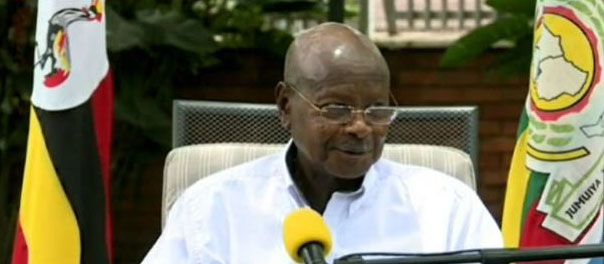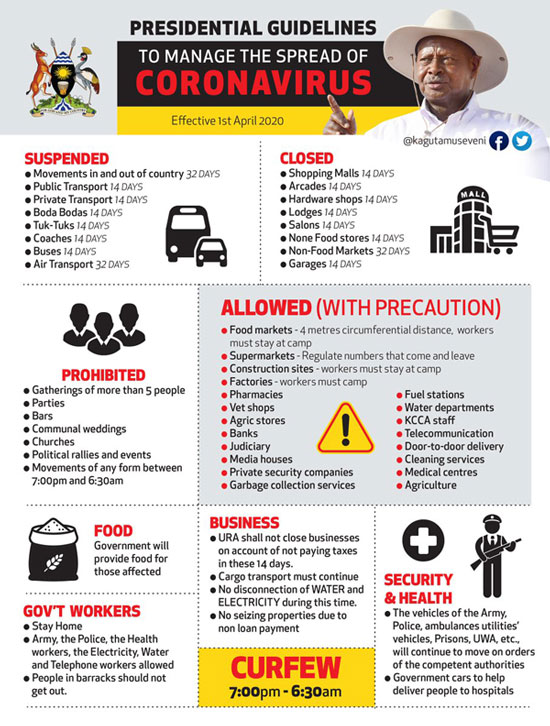
Uganda COVID-19 history
🔹 April 14 – ……. – TOTAL 54
🔸 April 13 – 0 new cases – TOTAL 54
↘ April 13 – 3 Discharged
🔹 April 12 – 1 new case – TOTAL 54
↘ April 11 – 4 Discharged
🔸 April 9-11 – 0 new – TOTAL 53
🔸 April 8 – 1 new – TOTAL 53
🔹 April 7 – 0 new cases – TOTAL 52
🔹 April 6 – 0 new cases – TOTAL 52
🔹 April 5 – 4 new cases – TOTAL 52
🔸 April 4 – 0 new cases – TOTAL 48
🔹 April 3 – 3 new cases – TOTAL 48
🔸 April 2 – 1 new case – TOTAL 45
🔹 March 31 – 11 new – TOTAL 44
🔹 March 28 – 7 new cases – TOTAL 30
🔸 March 27 – 5 new cases – TOTAL 23
🔹 March 26 – 4 new cases – TOTAL 18
🔸 March 25 – 5 new cases – TOTAL 14
🔹 March 23 – 8 new cases – TOTAL 9
🔸 March 21 – First case – TOTAL 1
Kampala, Uganda | THE INDEPENDENT | President Yoweri Museveni has extended Uganda’s COVID-19 lock-down for 21 days. All measures previously announced to contain the spread of the Coronavirus COVID-19, will stay in place until May 5.
“Government has decided to keep the stay home decision for another 21 days (April,15 to May 5, 2020) to allow us to study the situation longer. Thus, all the measures as previously announced will continue. We shall defeat this virus by protecting our people from its rapid spread,” said President Museveni in a live address.
Uganda has heeded a call by the World Health Organisation (WHO) not to lift restrictions quickly. The World Health Organisation has in the past week warned countries against lifting lockdown restrictions quickly even in cases where the Coronavirus pandemic may have reached a plateau.
Uganda has so far 54 confirmed cases, and at the weekend released seven who have recovered after testing negative twice after 21 days of confinement.

– Don’t act too quickly, says WHO
World health experts in the past week feared that governments will bow to economic and social pressure to lift their lockdowns prematurely, and warned that such a move could allow COVID-19 to return.
“Lifting the restrictions too quickly could lead to a deadly resurgence,” World Health Organization chief Tedros Adhanom Ghebreyesus has said.
Christian Brechot, Institute Pasteur president and former head of French national medical research institute INSERM, said we must be “very humble and very careful” with a virus that many nations have already underestimated.
“It’s not clear with a pandemic of this scale how everything can miraculously return to normal,” Brechot told France Info radio.
– European nations begin lifting –
Despite such advice, in the hardest-hit continent Europe — where more than 78,000 people have died from the virus — several countries have already started partially lifting confinement measures.
Germany, which has seen new cases drop and was already less affected than some of its neighbours, appeared Monday to be moving towards lifting restrictions in stages.
Austria will allow small businesses to reopen after the Easter break, believing it has sufficiently flattened its infection curve.
Denmark will reopen daycare nurseries, kindergartens and primary schools from April 15, while the Czech Republic has already begun to gradually ease restrictions, including opening some shops.
The countries are following in the footsteps of China, which has loosened its unprecedented lockdown on the city of Wuhan, where the coronavirus emerged in December, after the strict measures appeared to have paid off.
– ‘Very high plateau’ –
Elsewhere in Europe, however, there are fewer signs that restrictions will soon ease.
Britain passed the grim milestone of 10,000 deaths on the weekend while France is expected to extend its lockdown for at least several weeks.
France’s national health service director Jerome Salomon said a slight decrease in intensive care admissions was a “pale ray of sunshine,” adding that “a very high plateau” seemed to be setting in.
The continent’s hardest-hit countries Italy and Spain also seem to have reached such a high plateau, with their daily death rates gradually falling.
But after such a devastating period, neither country is letting down its guard — Italy has extended its confinement measures until May 3, while Spain has done the same until April 25. Ireland, Portugal and Belgium have also extended their measures.
 The Independent Uganda: You get the Truth we Pay the Price
The Independent Uganda: You get the Truth we Pay the Price



